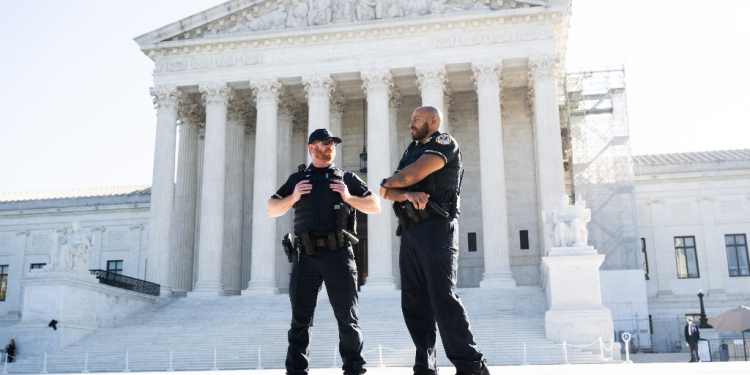(AFP) – The US Supreme Court began its new term on Monday with gun regulation, transgender rights, and online porn on a docket that risks being gate-crashed by the presidential election. David Cole, legal director of the American Civil Liberties Union (ACLU), which frequently brings cases before the highest court, said he expects “a much quieter term than we’ve had in the last couple of years.”
“But you know, that could change if the presidential election is close and disputed,” Cole added in a reference to potential lawsuits stemming from the November 5 White House contest between Republican Donald Trump and Democrat Kamala Harris. One of the first cases the justices will hear — on Tuesday — involves ghost guns: firearms sold online or in stores as kits that can be easily assembled at home. Gun manufacturers and owners are objecting to a rule from the Bureau of Alcohol, Tobacco, Firearms and Explosives that requires ghost guns, like other firearms, to have serial numbers and background checks for purchasers.
Another high-profile case involves the deeply divisive issue of gender-affirming medical care for transgender youth. The Justice Department is challenging a Tennessee ban on treatments for transgender minors, such as puberty blockers or hormone therapy. Tennessee is one of some two dozen Republican-led states enforcing such restrictions. The Supreme Court will also hear arguments about a Texas law requiring pornographic websites to verify the age of visitors in order to limit the access of minors to online sexual content. The law mandating the sites to require state-issued identification from users has been challenged by the adult entertainment industry on the grounds it violates free speech rights guaranteed by the First Amendment to the Constitution.
The Supreme Court has also agreed to decide whether a $10 billion lawsuit filed by Mexico accusing American gunmakers of fueling drug trafficking and violence can go ahead. A pair of death penalty cases are also on the docket, one involving DNA evidence and another on whether a man on Death Row in Oklahoma for more than 25 years received a fair trial.
– ‘Increasingly eroding credibility’ –
The Supreme Court disposed of a number of cases without comment on Monday, including a Biden administration appeal in a Texas abortion case. The top court let stand a conservative lower court’s ruling that hospitals in Texas — whose abortion laws are among the strictest in the country — are not required under federal law to perform emergency medical abortions.
Looming over the Supreme Court’s fall term is the November presidential vote and the possibility it may be forced to step in to resolve election disputes. In a landmark decision last term on a case filed by Trump — who is charged with conspiring to overturn the results of the 2020 election — the conservative-dominated court ruled 6-3 that a former president has broad immunity from criminal prosecution. The justices also dismissed a Colorado court ruling that would have barred Trump from the ballot because of his role in the January 6, 2021, assault on the US Capitol by his supporters.
The politically charged rulings, ethics scandals, and the decision two years ago to strike down a nationwide right to abortion have contributed to near record-low approval ratings for the Supreme Court, particularly among Democrats. Fifty-two percent of the Americans surveyed in a Gallup poll in July said they disapprove of the way the court is handling its job, while 43 percent said they approve.
“The real issue in the new term is about the court itself — that is, the Supreme Court’s increasingly eroding credibility, and what, if anything, the justices are going to do about it,” Nancy Gertner, a retired federal judge, and Stephen Vladeck, a professor at Georgetown University Law Center, said in a New York Times essay. The court adopted an ethics code last year following reports of luxury vacations received by conservative justices Clarence Thomas and Samuel Alito, but it was criticized for lacking an enforcement mechanism.
Thomas and Alito also both rebuffed calls to recuse themselves from cases related to the 2020 election — Thomas because his wife supported Trump’s efforts to overturn the results, and Alito because flags linked to Trump’s false election claims were flown outside his home. Three of the nine justices on the top court — Neil Gorsuch, Brett Kavanaugh, and Amy Coney Barrett — were nominated by Trump, giving conservatives a 6-3 majority. Democratic President Joe Biden proposed reforms of the nation’s highest court in July — including limiting a justice’s current lifetime appointment to an 18-year term — but there is little to no chance of passage in a deeply divided Congress.
– Chris Lefkow
© 2024 AFP











